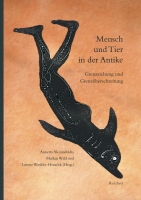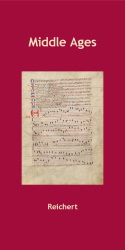Search
Editors: Alexandridis, Annetta; Wild, Markus; Winkler-Horacek, Lorenz
Mensch und Tier in der Antike
Grenzziehung und Grenzüberschreitung
2009
17.0 x 24.0 cm, 588 p., 75 illustrations b/w, 40 Tafeln, hardback
ISBN: 9783895005831
17.0 x 24.0 cm, 588 p., 75 illustrations b/w, 40 Tafeln, hardback
58,00 €
ISBN: 9783895005831
Short Description
These conference proceedings explore the encounter of human and animal nature from a philological, historical and archaeological perspective in areas such as the body, myth, religion and cult, politics and philosophy. Ancient texts and images present a broad variety of approaches to the question of how, if at all, to define the boundaries between both species. At the same time it becomes evident, how strongly the conception of both humans and animals were shaped by anthropomorphism, so that a distinction between both is in the end impossible.Description
The relation between humans and animals has undergone a recent paradigm shift. New technologies and especially ethical discourses have blurred the boundaries between human and animal. This causes much uncertainty which must be understood against the backdrop of a specific Western tradition rooted in Graeco-Roman antiquity. But how narrowly defined were the boundaries at that time? The present volume, the proceedings of an international conference held at Rostock University in 2005, explores ancient ideas of boundaries between humans and animals as well as their transgression from philological, philosophical, archaeological and historical points of view. In addition to Classical antiquity, Scythian and Egyptian civilizations are also considered.The papers investigate the conceptions that stand behind presumed natural features/characteristics of humans and animals. They do not focus on realia, but on the ideas that manifest themselves in language, text and image and that could become constitutive for reality. The volume's interdisciplinary approach allows for capturing the spectrum and complexity of the ancient imagination, in which strict dichotomies and definitions parallel gradual differentiation to the point of dissolving boundaries. The contributions include investigations of various models of the scala naturae in Plato, Aristotle and the Stoics; the use of animals as analogy or symbol in political discourse as well as in ritual contexts; hybridity and metamorphosis in visual (Greek vases, cult images, late antique mosaics) and literary traditions (Aristophanes, Ovid); hierarchies and taxonomies in society and religion, for instance in the context of hunt or sacrifice or at the edges of the world where other rules prevail. All testimonies share a conception of humans and animals that is based on an anthropomorphic approach already fixed, to some extent, in language. Although the transfer of hierarchies between humans and animals onto the relation between men and women or between culture and nature serves to reinforce oppositions, it proves at the same time that both parts are inextricably intertwined.
The volume inlcudes papers in German, English, Italian and French.
Biographical Note
Annetta Alexandridis teaches Classical Art and Archaeology in the Department of History of Art and Visual Studies at Cornell University. She studied Classical Archaeology, Ancient History and History of Art in Paris, Perugia and at the Ludwig-Maximilians-Universität in Munich, where she received her PhD in 1997. From 1998-99 she worked at the Antikensammlung in Berlin. From 1999-2005 she taught in the Department of Classics at Rostock University. Her publications include Die Frauen des römischen Kaiserhauses (Zabern 2004) and Archäologie der Photographie (together with Wolf-Dieter Heilmeyer, Zabern 2004). She is currently working on a book on Shifting Species: The Iconography of Metamorphosis and Zoophilia from the Archaic to the Hellenistic Period.Markus Wild teaches Philosophy of Mind and Philosophy of the Early Modern Period at the Department of Philosophy at Humboldt University, Berlin. He studied Philosophy and German language and literature at Basel University, where he received his PhD in 2004. His publications include Die anthropologische Differenz. Der Geist der Tiere bei Montaigne, Descartes und Hume (de Gruyter 2006) and Tierphilosophie (Junius 2008). Together with Dominik Perler he edited Der Geist der Tiere. Philosophische Texte zu einer aktuellen Diskussion (Suhrkamp 2005).
Lorenz Winkler-Horaček is curator of the collection of plaster casts at the Free University of Berlin, where he also teaches Classical Archaeology. He studied Classical Archaeology, Ancient History and Islamic Studies at the Free University of Berlin and at the University of Heidelberg, where he received his PhD in 1991. From 1993-2007 he taught in the Department of Classics at Rostock University. His publications include Salus. Vom Staatskult zur politischen Idee (Archäologie und Geschichte 1995) and Monster in der frühgriechischen Kunst. Die Überwindung des Unfaßbaren (de Gruyter 2008). His research focuses on images as part of cultural encounters, Roman representational art and different forms of visual communication.




 Table of Contents
Table of Contents

 Neuerscheinungen 2023/2024
Neuerscheinungen 2023/2024
 Gesamtverzeichnis 2023/2024
Gesamtverzeichnis 2023/2024
 Katalog Oriental Studies & Linguistics
Katalog Oriental Studies & Linguistics
 Mittelalter
Mittelalter
 Deutsche Inschriften
Deutsche Inschriften
 Musiktherapie
Musiktherapie
 Literaturen im Kontext
Literaturen im Kontext